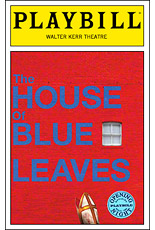
*
Even before blue leaves start to fall on The House of Blue Leaves, which opened for inspection April 25 at the Walter Kerr, there's an ill wind whipping around the dumpy apartment in Sunnyside, Queens. Not to put too fine a point on it, but it's Oct. 4, 1965, the day Pope Paul VI visited New York — the first time a reigning pope ever came to this country — and that fact has made everybody a little crazy.
Not that they weren't already. The sad man of this manor is Artie Shaughnessy, a zookeeper by trade and a songwriter by desire, but he's stuck in this back-corner of drear because he has been bookended by his choice of women, Bananas and Bunny.
The names are no accident. Bananas, long-gone in that direction, is the wife in the grip of agoraphobia, which is aggravated by her husband's affair with the chippie downstairs. This would be Bunny. She and Artie met "cute"—in a steam room.
Three over-the-title stars (Ben Stiller, Edie Falco and Jennifer Jason Leigh) spend Act One hammering out what to do — how to "nicely" drop Bananas off at the nuthouse so Artie and Bunny can get to a proper honeymoon. Then Act Two lowers the drawbridge, and some more impossible dreamers board the play — three rubbernecking nuns in ecclesiastical ecstasy about their proximity to His Holiness (Mary Beth Hurt, Susan Bennett and Halley Feiffer); a blonde movie goddess whose hearing went south after an on-set mine explosion (Alison Pill) and her hot-shot movie producer-boyfriend who is Artie's hoped-for "open sesame" to Hollywood (Thomas Sadoski).
Oh yes, and the Shaughnessy prodigal, Ronnie (Christopher Abbott), returns as well, AWOL from the Army, with a little ticking present for the Pope.
As you can see, stars and name players have been thrown at this second Broadway renovation of John Guare's 40-year-old dark, daffy opus on galloping dysfunction. If you recall the revival of '86, where director Jerry Zaks went for the zany and the Tony (five big ones), you'd best forget it. That wouldn't help you here. Director David Cromer has gone for a more measured, middle-ground approach, lowering the humor while raising the humanity of these lost souls.
"Our goal was just truthful behavior," Cromer said. "Even in bizarre situations like this, you never abandon truth. That has to happen.
"There's a difference between reality and truth. Reality is realistic. It's based in gravity. You don't suddenly turn to the audience and speak to the audience. This is ideally truthful behavior, which is the behavior of the play. Characters can turn and speak to the audience. Nuns climb over the roof and come in the window. Absurd things happen. That's the truthful world they live in, so that can't be treated as though it's just comedy. It has to be treated like it's really happening so that creates the tilted universe because it's a universe in which things like that happen."
Fittingly, he pointed out, the whole thing is played out on a tilted stage. That's "raked" in the parlance of showfolk.
[flipbook] For a guy who hails (by way of Chicago) from Grover's Corners, NH — he was the director, and the initial stage manager, for 2009's Barrow Street Theatre revival of Thornton Wilder's Our Town, that play's longest run ever — Cromer spends an inordinate amount of time refereeing home-front chaos, which begs the obvious question if he has an affinity, or a special affection, for the dysfunctional family.
"It was in my lifetime that television shows and plays started to allow for the fact that everyone else's family wasn't perfect but yours," he said. "The illusion that your family was the only one that was screwed up was something that people believed. When John's generation of writers started letting people know other people's home lives were complicated too, that helped people. Actually, it began with Long Day's Journey and continued through '70s with Lanford Wilson and Albee.
"The common experience that you want in the theatre is that you are not alone — literally, that you're not alone, that you're watching it with people wrapped up in the concerns of the people in the play, that your secret worries and fears are not only yours but they're everybody's. That's the unifying power of theatre. I think it's not that they're just dysfunctional. It's that they're flawed and complicated. As ugly as some of those stories are, it's actually an act of grace to give them to an audience."
As the play begins, Artie is discovered somewhere between his zoo office and his carnival-show home, in a seedy nightclub banging out a medley of his non-hits to an apathetic audience. All his songs sound like the same, save for one, and that sounds like "White Christmas" — but Stiller knocks 'em out with a practiced panache that's wholly acted. Truth is, it's his first brush with a piano ever, but his teachers, Gary Dial and Gerard D'Angelo, call him an apt and eager pupil.
"It's motivation when you know you have a date coming up where you have to play in front of an audience," Stiller was quick to point out. "I don't really talk about it much because I feel it's part of who the character is. Artie just plays a little, so it was necessary to do it. I don't want people going, 'Oh, he had to learn to play the piano for it.' It's just part of who Artie is. At first it was hard because I'd never done it before. Playing for people, I found, was very different from playing for yourself. All of a sudden, there's a whole different little level to it. You have to sorta deal with the stuff in your head. Once I got through that, then it was like, 'O.K., I figured out I can still screw up and it'll be O.K.' Understanding how to screw up is important."
Couple the secret of his unsuccess with some insidiously memorable, awful songs dashed off by Guare himself, and you realize why Artie must keep his day job. "The songs are hard to get out of your head," allowed Stiller. "They're just catchy enough."
A fair critique, Guare agreed: "I auditioned the songs for Frank Loesser years ago, and he said, 'They're almost good enough. If it were ten years earlier, I'd sign you.'" The playwright pushed the songwriter in him harder and more seriously for 1998's Landscape of the Body, with Sherie Rene Scott honoring them.

Buy this Limited Collector's Edition |
"Something different" feels like emotionally unchartered turf to Leigh, as the manipulative little mantrap one floor down. "In a way, it's free-fall," she said, "but it's so beautifully directed within that. It's a very risky play in certain ways, but in other ways it's so beautifully constructed. The audience really goes with it. It's exciting to see someone laughing so hard, and then there'll be a mysterious monologue. Really, they go from laughing so hard and so loudly to where you can hear a pin drop. It's exciting as an actor to feel those shifts, and this play has so many of them and so many different styles, yet the way David has directed it, it holds them all.
"I'm sad we're opening because I'm going to miss seeing him every day and working with him. I'd come up to him at night and say, 'Tonight, what am I going to do?' And he'd give me one note to play for the night. It's just a fun thing we started doing."
Halley Feiffer marks her Broadway debut as the so-billed Little Nun, who starts out with few lines and abruptly emerges in the last scene as one of the play's most haunting characters. "That's why she's so funny," Feiffer said, underlining Guare's little joke. "This character comes out of nowhere. You think that she's one thing — 'Oh, I get it. She's one of the nuns' — and then she stays because she hates the convent so much she doesn't want to go back, and she finds a home and solace and refuge in this kooky family who don't love her back but she loves them.
"This is one of my favorite plays, ever. When I read the script, I barely remembered the character was the Little Nun, and, through working with David, we discovered so much about this character. David has said there's only one character in the play who has a spiritual awakening, and that's my character. I am able to look at all this chaos and devastation around me and still see joy and light and beauty. I have this cheery, optimistic, positive outlook in the face of what other people could think of as bleakness. I have a true awakening. I think that it's extremely beautiful and funny." A vintage gown instead of her nun's habit and a new wig earn Feiffer a big audience double-take. "The wig," she noted, "is all David's idea. David modeled the character after a tragic girl he went to high school with. He wanted a truly black wig for me."
 |
||
| Alison Pill |
||
| photo by Joseph Marzullo/WENN |
Playwright Guare bopped by to grab a hand-kiss from Pill like some gentleman of the old school. "Alison is one of the finest actresses around these days," he declared within ear-shot of the press. "She didn't have to be gorgeous. Talent was enough."
Although they had plenty of scenes together in reasons to be pretty, Pill and Sadoski have no scenes together in The House of Blue Leaves, even though the characters are engaged. Playing Artie's best bud, he commits an unforgivable act that flies in the face of that friendship, but he does it in such a casual way that it seems not to rock the boat much. Asked how he got away with it, Sadoski said, "You gotta make the leaps. John puts them in there for you to make, and you gotta find out a way to make them. Sometimes it's hard to make that leap, but John has been so good about helping, saying, 'This is what I think it comes from. Find something real inside of you to help inspire you to make that big leap.' I think we've done a pretty good job of it."
This is Stiller's second Broadway show — and the second time he has resided in The House of Blue Leaves. At 21, he was the soldier-boy anarchist; a quarter of a quarter of a century later, he has returned as the head of that house. But Abbott, who plays Ronnie now, said that no notes or acting tips have passed between them.
"He didn't throw me any advice," admitted the new Ronnie, "but he's definitely a lot of support, always joking around. The thing about this play — and, actually, with any play — is, like, the words are there. It just naturally gets richer and deeper and much more fulfilling, therefore much more fun to do. The fact that your mind plays that little game where you go in and out and you almost really believe it sometime."
The big after-party was splashed over three floors of Sardi's, and it still seemed like the whole theatre of first-nighters showed up to celebrate. It was very cramped, but full of good-cheer as well, and that feeling started with the arrivals.
Anne Meara, who was Bunny in the original 1971 Off-Broadway production of The House of Blue Leaves, and hubby Jerry Stiller showed up in support of their son, the Broadway Star, and worked the press line like the vets that they are.
 |
||
| Jennifer Jason Leigh |
||
| photo by Joseph Marzullo/WENN |
Both parents continue to toil in the showbiz vineyards. Meara is having a run April 27-May 29 at Love, Loss, and What I Wore at the Westside Theatre on West 43rd, and Stiller has lined up a summer play: "I just did a reading for Peter Shaffer and Tony Walton — a play called The Gift of the Gorgon — with Alec Baldwin. He's my father. We're Russian emigres, but you wouldn't know it from listening to us — except me. We're going to do it out in Long Island in July. It's an amazing kind of show that deals with Greek tragedy and how it affects a writer who wants to put everything that's true in life out on the stage, and it becomes something of a problem because people don't like unhappy endings."
Stiller the younger just finished a caper flick in the city, "Tower Heist," with Eddie Murphy, Tea Leoni, Casey Affleck and Gabourey Sidibe — and others from that film's cast stuck around for the opening: Glengarry Glen Ross's Alan Alda, Fences' Stephen McKinley Henderson and the previous How To Succeed's Matthew Broderick. Broderick and Nathan Lane — Together Again — doubled up for the press gauntlet, leap-frogging through the reporters in half the time. Smart guys, those Producers.
Another Stiller film that was well-represented was "Tropic Thunder," via Steve Coogan (in town promoting his new flick, "The Trip"), Jay Baruchel (Pill's beau) and Christine Taylor. She is also Mrs. Ben Stiller and "more excited than nervous. I've done movies with Ben and I've done movies before Ben, and now I'm in Mom mode" (to Ella, 9, and Quintin, 5).
Falco had her following, too — musical ones, in fact: Melissa Etheridge ("My partner [Linda Wallem] is the creator of 'Nurse Jackie,' and I became good friends with Edie through that") and Liza Minnelli ("I've seen this, and I'm coming back again because I liked it so much. And also I wanted to support my friends. I know Edie. I've met Ben, but I'm rootin' for the girls."). Indeed, for the second night in a row, La Minnelli made her way back to the press area to personally congratulate the stars. When Falco finally arrived, the two of them jumped for joy.
As Monday is a dark night for most Broadway shows, stars were uncaged from Bengal Tiger at the Baghdad Zoo (Glenn Davis and Arian Moayed), The Motherf**ker With the Hat (Elizabeth Rodriguez and Yul Vazquez) and Jerusalem (Geraldine Hughes and Max Baker).
Also: Bob Stillman (taking a night off from the McCarter and Sleeping Beauty Wakes, a new musical by the people who did Striking 12), The Public's Oskar Eustis, Yank choreographer Jeffry Denman, Cabaret's Alan Cumming, Long Story Short's Colin Quinn, Go Back to Where You Are's Brian Hutchison, Ireland-based playwright Sally Ottway, George Stevens Jr., interior designer Nate Berkus, Malcolm Gets (still bearded from his West Coast bow of the Little Miss Sunshine musical), Jason Butler Harner (currently rehearsing Through a Glass Darkly with Carey Mulligan and Chris Sarandon, under David Leveaux's direction) and Tamara Tunie.
View highlights from the show:
























































